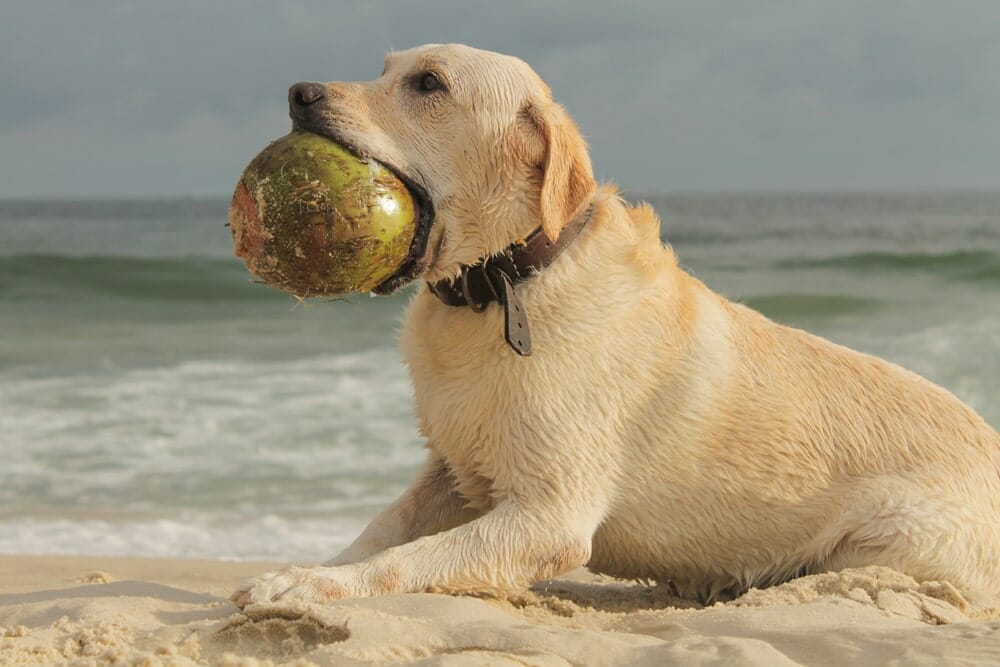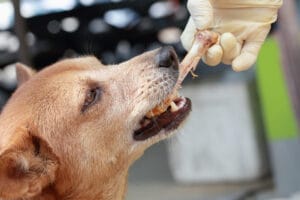Coconut is a great treat that makes its way into many human recipes, drinks, and desserts. Besides its delicious tropical taste, coconut is also high in minerals, vitamins, and healthy fats. The dense white coconut flesh often called ‘meat,’ is good as a snack, and we all know what we want to do when it comes to snacks – share them with our pups! But, can dogs eat coconut? Are coconuts good for dogs?
Left to their own devices, dogs will eat almost anything, and your number one priority as a dog parent should be learning what’s safe and not safe for your dog to eat. Given that some fruits like grapes can be toxic to dogs, it’s only right to wonder, can my dog eat coconut?
Is coconut ok for dogs or is coconut bad for dogs? And what about coconut oil and coconut ice cream? If presented to your dog, they will undoubtedly dig in, but that’s not to say that it’s safe for your dog to eat.
Every fruit is different, and before you give anything new to your dog, it’s always a good idea to do a bit of a background check on the safety of the fruit for your pet.
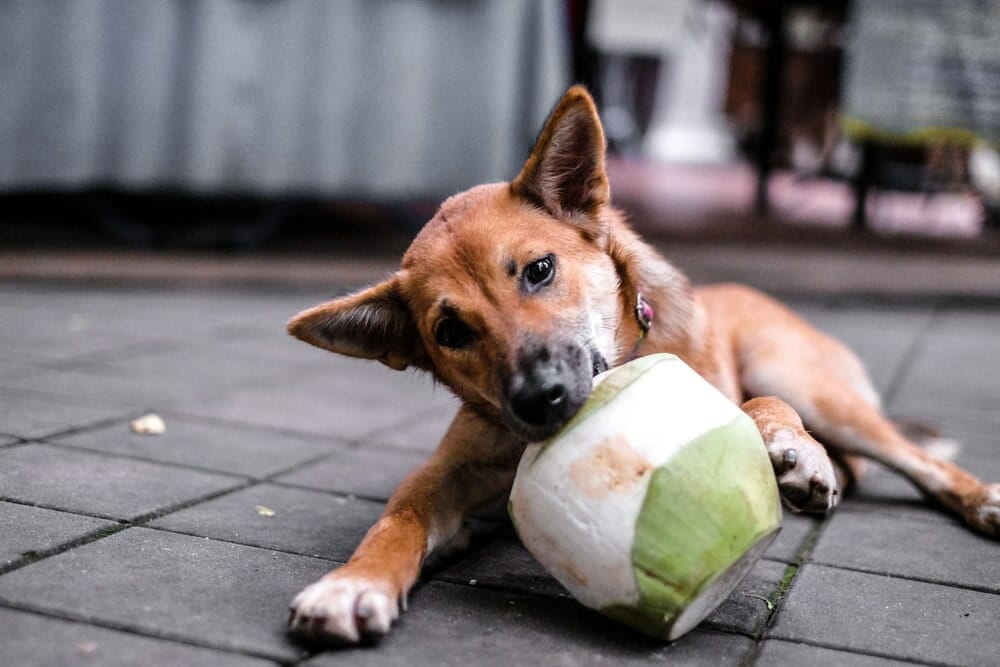
Can Dogs Eat Coconut?
You may be wondering, “can dogs eat coconut?” – the answer is a resounding yes! It’s safe for dogs to eat coconut, but it should be given in moderation and correctly prepared. Does that mean that it’s possible for your dog to eat coconut the wrong way? It does! You should never let your dog eat the hard shell or hairy texture of the coconut, to avoid a scary trip to the vet caused by choking or intestinal blockage. You should also avoid feeding your pet processed coconut that’s been turned into sugary sweets, cakes, and ice creams. Of course, coconut-based alcohol is also a no-no for any pet.
That said, as long as you serve it correctly and in moderation, coconut is safe and even beneficial for your dog. Apart from enjoying the rich flavor and aroma, when dogs eat coconut, they can benefit from healthy nutrients, vitamins, good fats, and a boost to their immune system.

Potential Health Benefits of Coconut For Dogs
Coconut isn’t just a tasty tropical treat—it also offers a variety of health benefits for dogs. From supporting skin health to boosting the immune system, coconut can be a nutritious addition to your pup’s diet when given in moderation. Here’s how coconut can benefit your dog:
Supports a Healthy Coat and Skin
Coconut is rich in medium-chain triglycerides (MCTs) and lauric acid, which help maintain healthy skin and a shiny coat. Lauric acid has natural antibacterial and antifungal properties, which may help soothe dry, itchy skin and reduce irritation caused by allergies.
Strengthens the Immune System
Coconut contains antioxidants and anti-inflammatory compounds that can help support your dog’s immune system. Lauric acid, in particular, has been shown to fight bacteria, viruses, and fungi, reducing the risk of infections.
Supports Brain Function and Energy Levels
The MCTs in coconut can provide a quick energy boost for active dogs and may even support cognitive function in senior pups. Studies suggest that MCTs could help improve brain health, making coconut a beneficial addition for aging dogs.
Aids Digestion and Gut Health
Coconut contains dietary fiber, which can promote healthy digestion and support gut health. It may help regulate bowel movements and reduce symptoms of constipation or mild digestive issues. However, too much coconut can cause loose stools, so moderation is key.
Provides Anti-Inflammatory Benefits
Coconut’s natural anti-inflammatory properties can be especially beneficial for dogs with arthritis or joint pain. Some studies suggest that MCTs may help reduce inflammation and improve mobility in aging dogs.
Are There Any Risks With Coconuts for Dogs?
While coconut offers several health benefits, it’s important to be aware of potential risks and side effects before sharing it with your pup. Although coconut is non-toxic to dogs, excessive consumption or certain coconut products can lead to digestive issues or other concerns.
1. Digestive Upset
Coconuts contain dietary fiber and medium-chain triglycerides (MCTs), which can be beneficial in small amounts. However, eating too much coconut may cause:
- Stomach discomfort
- Diarrhea or loose stools
- Bloating or gas
To prevent digestive issues, start with a small amount and monitor your dog’s reaction.
2. High in Fat and Calories
Although MCTs in coconut can provide an energy boost, coconut is still high in fat and calories. Overfeeding can contribute to weight gain or put extra strain on dogs with pancreatitis or other fat-sensitive conditions. If your pup is on a low-fat diet, it’s best to consult a veterinarian before introducing coconut.
3. Coconut Shell is a Choking Hazard
Never give your dog a whole coconut or pieces of the hard shell. The shell is tough and fibrous, posing a choking risk and potential for intestinal blockage if swallowed. Always remove the shell and only offer fresh coconut flesh or oil in safe portions.
4. Beware of Added Sugars and Artificial Ingredients
Many coconut-based products, such as coconut milk, coconut ice cream, or sweetened coconut flakes, contain added sugars, artificial sweeteners, and preservatives that can be harmful to dogs. Avoid products with xylitol, a common sweetener that is toxic to dogs.
5. Allergic Reactions (Rare but Possible)
Although uncommon, some dogs may be allergic to coconut. Signs of an allergic reaction may include:
- Itchy skin or rashes
- Excessive licking or paw chewing
- Vomiting or diarrhea
If your dog shows any signs of an allergy, discontinue feeding coconut and consult your vet.
Can Dogs Have Coconut Oil?
You might be wondering, “can dogs have coconut oil,” or “can dogs eat coconut oil?” – the answer is yes. Dogs can consume coconut oil in small quantities without getting poisoned, but no more than a teaspoon per day.
Although coconut oil has become popular as a healthier alternative for cooking oils, there isn’t much research supporting its benefits to dogs, unlike for humans. While it can decrease inflammation, help with sore throats and coughs, and improve digestion, if you’re going to feed your dog coconut oil, only add small quantities and go for non-hydrogenated, virgin coconut oil that’s free of additives. Hydrogenated coconut oil contains trans-fats that can raise your dog’s cholesterol levels.
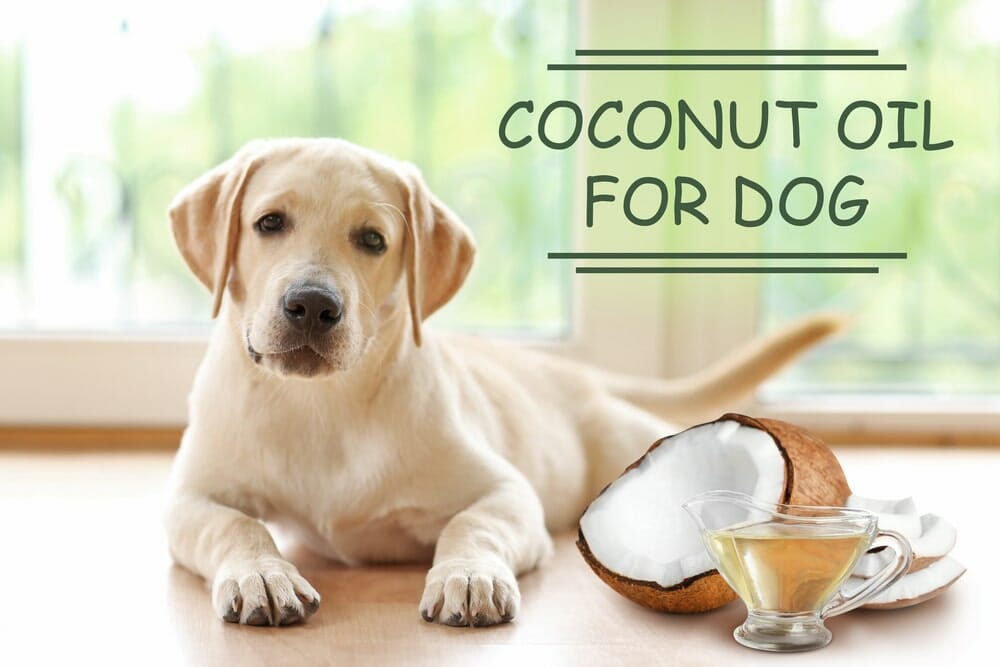
Remember that coconut oil won’t fulfill your dog’s dietary fat requirements and shouldn’t be the only fat source in homemade diets. It lacks essential omega-3 and omega-6 fatty acids and should only be added as a supplement to your dog’s already healthy diet.
Can Dogs Have Coconut Water?
Coconut water is a semi-clear, sweet liquid often found inside green, immature coconuts. The water hardens as the coconut ages and becomes the white meat that forms around the inside of the coconut shell. You probably love hydrating with exotic coconut water, but can dogs also enjoy coconut water safely?
The American Society for the Prevention of Cruelty to Animals (ASPCA) cautions against giving your dog coconut water because it’s high in potassium. High potassium concentrations can cause hyperkalemia in dogs and affect their heart’s functioning.
No significant benefits of coconut water have been found for dogs, and if you already feed them a balanced diet, you’re better off hydrating your pup with plain water rather than coconut water.
Can Dogs Consume Coconut Milk and Coconut Ice Cream?
If you’re indulging in a glass of coconut milk and wondering if your dog can have some too, the answer is yes, but only in small amounts. Coconut milk can be a good source of calories, especially for malnourished dogs or those with megaesophagus.
Coconut milk is a safe treat that can freshen your dog’s breath, but too much can cause loose stools and diarrhea. Many coconut milk products on the shelves also contain additives and preservatives that add a layer of concern. Non-organic varieties may even contain pesticides that can harm your dog.
Natural, organic coconut milk products are the best option for your pup. On the point of ice cream, the answer is also yes, but only if it’s made from unsweetened, organic coconut milk. This means no sugary store-bought ice creams for your pet. Avoid feeding your dog any sweetened coconut product. Added sugars aren’t healthy for your furry friend and can cause gastrointestinal upsets and weight gain.
Never give your dog coconut ice cream that contains chocolate, caffeine, or artificial sweeteners like Xylitol.
Safe Treat Option for Your Dog
Coconuts should only be given in small amounts as an occasional treat that supplements your dog’s diet and should never replace a balanced meal. You can find tastier alternatives that help you meet your dog’s nutritional needs and requirements at Spot and Tango.
Spot and Tango guarantees complete and balanced meals, formulated by veterinary nutritionists, to meet nutritional levels established by the Association of American Feed Control Officials (AAFCO). Spot and Tango prepare affordable, gluten-free, non-GMO wet and dry dog food with 100% natural ingredients.
Everything is cooked fresh, ready to serve, and full of fresh fruits and vegetables with benefits that exceed those from coconut. What’s even better is that no artificial additives, preservatives, or fillers are used.
One of the best fresh recipes is the Spot and Tango Beef and Millet. It exudes a delectable aroma and flavor guaranteed to appeal to your dog. This meal contains cranberries that are not just good for your dog like coconut, but super good. Cranberries contain vitamin C, K1, E, and manganese, and are full of antioxidants, fiber, quercetin, and proanthocyanidin. These support your dog’s immune system, gut, brain, and urinary health while preventing cancer, allergies, joint pain, and heart disease.
Spot and Tango meals are cooked to order, packaged, frozen to preserve freshness, and delivered to your doorstep within days of being made. You can create a personalized meal plan for your pup according to their profile and dietary needs, and know that meals will remain fresh and healthy for extended periods without any preservatives. Simply defrost each meal when it’s time to feed your dog and serve.
If you prefer the convenience of dry food, join the Unkibble revolution with Spot and Tango’s Unkibble, which brings you the benefits of a fresh diet in a dry format. Nutritional integrity is maximized thanks to this vet-developed innovation at Spot and Tango that combines fresh meat, fruits, and veggies in a unique Fresh Dry process.
Unlike store-bought kibble and other dry foods, Unkibble is made with 100% fresh, human-grade ingredients, and no preservatives, sweeteners, fillers, or additives are used. It smells as good as it looks, and the Fresh Dry process ensures every Unkibble bite bursts with nutrition and flavor.
How To Safely Feed Coconut To Your Dog
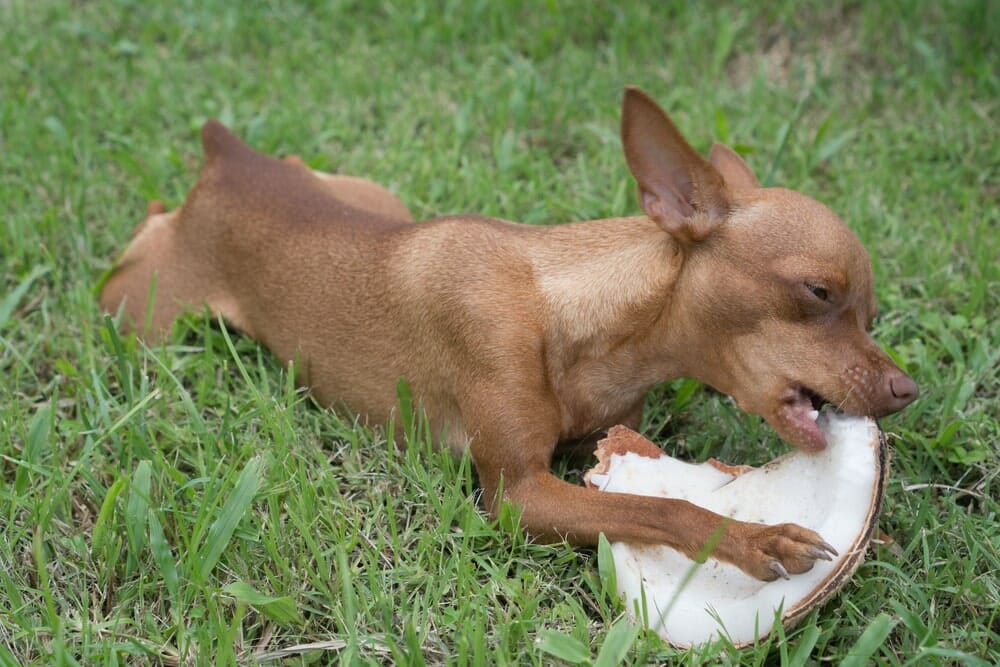
You can safely feed coconut to your dog provided you follow the following guidelines:
- Ensure you remove the husk and keep it away from your dog. It’s a choking hazard waiting to happen if swallowed.
- Start with small amounts and don’t exceed the recommended 10% daily caloric intake for supplements and treats.
- Always choose natural, organic coconut and avoid processed coconut if unsure of the ingredients. Ensure any raw coconut you feed your dog is free of the husk and chopped into small, easy-to-chew pieces or slivers.
- Avoid sweetened coconut because the added sugars aren’t healthy for your dog. Choose unsweetened varieties.
- You can feed the coconut pieces immediately or freeze them for later. A frozen coconut piece can keep your pup occupied for longer than regular treats can, and can help cool them down in warmer months.
- Only give a few pieces, shreds, or flakes on top of their food as a flavor boost or treat, rather than as an entire meal replacement. Instead of giving coconut oil or milk straight up, it’s best when mixed or added to other things your pup naturally eats as part of their regular meal regimen now and again.
- Ensure you never give coconut that has gone bad to your dog. Coconut can go bad over time and lead to diarrhea, vomiting, or stomach upsets when consumed.
Frequently Asked Questions
Is Coconut Bad For Dogs?
Coconut can only be bad for dogs if given in excess or not properly prepared. Coconut contains medium-chain triglycerides, which aren’t usually an issue in small amounts. They can cause stomach upsets, constipation, diarrhea, and vomiting in large quantities.
The husk is hard, difficult to chew, and indigestible, which can result in choking or intestinal irritation and blockage when swallowed. The hairy texture can also gather in the stomach or intestine when swallowed and affect your pup’s bowel movements.
Coconut oil is a fatty ingredient that can cause unhealthy weight gain in large quantities or if you give it to your dog too frequently. It can cause diarrhea, headaches, fatigue, or lethargy when consumed excessively and severe gastrointestinal problems in some dogs, even in small amounts. Therefore, it’s wise to proceed with caution by first consulting your vet.
Too much coconut milk or coconut milk-based foods can also cause loose stools and diarrhea in your dog. Coconut milk can be overly processed with dangerous additives and preservatives your dog doesn’t need, and no real benefits. Always go for unsweetened, organic coconut milk and introduce it to your dog in small quantities.
There is always the risk of allergic reactions when introducing new food to your dog’s diet. Watch out for greasy stools, diarrhea, or fatigue after feeding your dog coconut. Stop serving if you notice anything out of the ordinary, and contact your vet to rule out any bigger issues.
Can Dogs Eat Dried Coconut?
Dogs should only eat small amounts of unsweetened, dried coconut, free of additives, fillers, or preservatives. Dogs don’t need added sugar to have a balanced diet, so sweetened, dried coconut will only increase their risk of diabetes or unhealthy weight gain.
Xylitol is widely used as a sugar substitute in processed products, and it can cause hypoglycemia and a profound drop in blood pressure when ingested by dogs. Even small amounts or traces of Xylitol can cause hypoglycemia, while large amounts can cause liver failure. Symptoms can develop within an hour, including vomiting, weakness, tremors, seizures, or lethargy.
If you’re unsure of the ingredients in dried coconut, it’s best to avoid feeding it to your dog. Spot and Tango’s Unkibble is a great, fresh alternative to dry dog food. Your dog will benefit from dry food prepared by vet nutritionists with vitamins, fiber, antioxidants, and a great taste.
How Much Coconut Should I Feed My Dog?
Moderation is key when feeding coconut to your dog. A few small chunks of fresh coconut flesh or a teaspoon of coconut oil can be a healthy treat. For general guidelines:
- Small dogs: 1 teaspoon of coconut oil or a small bite of coconut flesh
- Medium dogs: Up to 1 tablespoon of coconut oil or a few small pieces
- Large dogs: 1–2 tablespoons of coconut oil or a few larger coconut chunks
Feeding too much coconut may cause digestive upset or weight gain, so introduce it slowly and monitor your dog’s reaction.
Is Coconut Good for a Dog’s Skin & Coat?
Yes! Coconut is great for a dog’s skin and coat because it contains healthy fats and lauric acid, which have moisturizing and antibacterial properties. Benefits of coconut for skin and fur include:
- Hydrated, shiny coat
- Reduced itchiness and irritation
- Natural antibacterial and antifungal support
Both feeding coconut (in moderation) and applying coconut oil topically can improve coat health and skin hydration. If your dog has skin allergies or dryness, coconut oil may help—but always check with your vet first!
What’s the Best Type of Coconut for Dogs?
The best type of coconut for dogs is plain, fresh coconut flesh without any added ingredients. Here’s what to look for:
- Fresh coconut meat – Raw or dried, but always unsweetened
- Unsweetened shredded coconut – A great topper for dog food in small amounts
- Pure coconut oil – A teaspoon added to meals can support skin, coat, and digestion
Avoid these types of coconut:
- Coconut water – High in potassium, which may be too much for some dogs
- Sweetened coconut flakes – Contains added sugars and preservatives
- Coconut-based desserts (ice cream, cookies, etc.) – Often contain sugar, dairy, or artificial sweeteners like xylitol, which is toxic to dogs
For the safest option, stick to fresh coconut and always introduce it in small amounts to see how your dog reacts!
Conclusion
It’s safe to say that most dogs enjoy the taste of coconut, and generally speaking, it’s a healthy snack they’ll willingly eat. Coconut treats can help fortify your dog’s immune system, reduce inflammation, and improve their coat and skin.
However, moderation is key, and although coconuts are generally safe for dogs to eat when prepared correctly, it’s always wise to consult your vet before introducing a new food into your dog’s diet.
Remember that you can plan your dog’s meal according to their needs with Spot and Tango meal planner. Click here to find out the best recipes for your furry best friend and adapt them to their specific allergies or nutrition requirements.


